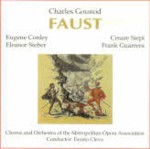Recorded in May, 1951, this recording features the best Mefistofeles on disc, and that’s saying a lot. With competition from Christoff, Ghiaurov, Journet, and van Dam, Cesare Siepi beats them all. Here in his prime, the beautiful voice is used intelligently, expressively, and utterly without grunts and growls; he finds no need to over-emphasize the role’s evils. He just articulates the text and sings the notes, modulating his dynamics with expertise and managing to bring out both the menace and charm of this devil.
Eugene Conley’s Faust is good. He’s musical, graceful, and not afraid of heights, and if his voice lacks an instantly recognizable timbre, at least he seems involved in what he’s doing and the quality of the voice is pleasing. Much the same may be said about Frank Guerrera’s Valentin. He has no trouble with the role’s high tessitura and he sings both the lyrical moments and his denunciation of Marguerite with firm tone, but it’s hard to recall individual moments. Eleanor Steber’s Marguerite is warmly sung, but with a girlish glint at first, entirely suitable. She doesn’t quite have the big tone to pull off the Church Scene, but overall she’s terrific. Met stalwarts Margaret Roggero and Thelma Votipka as Siebel and Marthe, respectively, are fine.
Chorus and orchestra are at their best for the Met in those years, which is pretty good without really being first rate. Fausto Cleva’s fleet tempos are both welcome and a bit too fleet–for instance, “Le veau d’or” is a bit too jolly sung so fast–but the action never lags. The Walpurgisnacht scene and Marguerite’s extra aria at the start of Act 4 are cut. A first Faust? Probably not–although no other recording is ideal either. But Siepi is magnificent, Steber is a joy, and this is an honest if not particularly deep or inspired musical telling of the story.
































